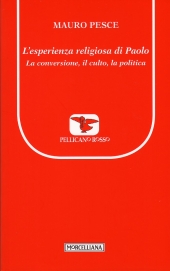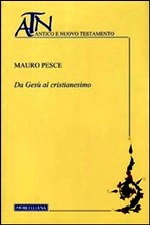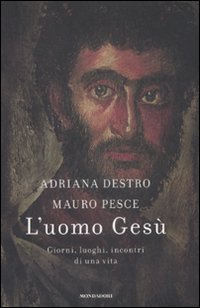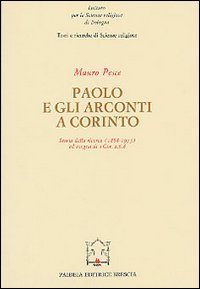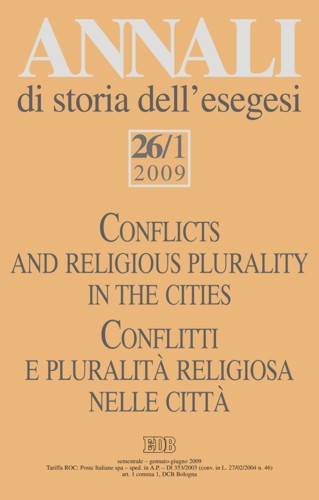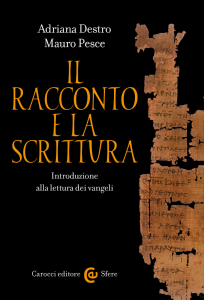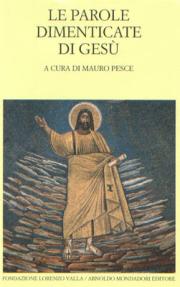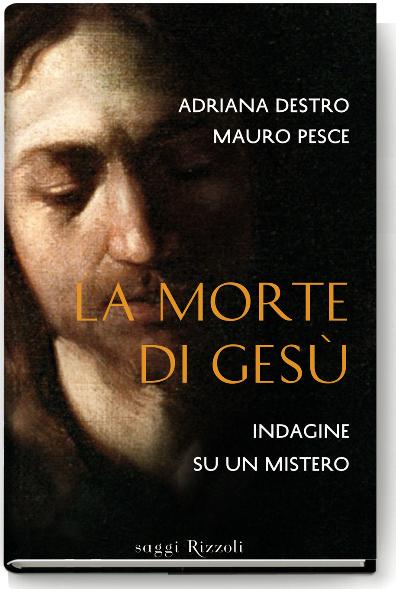Un libro al giorno nr.16 Maria Osmers, Vergangenheitsbezüge
- Dettagli
- Categoria: Documenti
- Pubblicato Giovedì, 11 Settembre 2014 08:25
- Visite: 4072
In un articolo sui racconti dell'infanzia del vangelo di Matteo Adriana Destro e io abbiamo sostentuto che la genealogia di Matteo ha la funzione di legittimare la sottomissione dei popoli della Siria alla regalità di Gesù "re dei Guidei" sulla base del fatto che quei popoli discendono da Abramo da cui viene il re Davide e poi Gesù re dei Giudei. Proponevamo di vedere nella genealogia da Abramo una rappresentazione testuale delle rappresentazioni monumetali della medesima idea che legittima la sovranità di un re su differenti popoli e territori sulla base della loro comune discendenza (vedi il grande complesso monumentale di Nemrod in Siria). Ora questo libro qui sotto segnalato offre una conferma perché la medesima ideologia politica esiste anche nella Gracia antica:
Maria Osmers, "Wir aber sind damals und jetzt immer die gleichen": Vergangenheitsbezüge in der polisübergreifenden Kommunikation der klassischen Zeit. Historia Einzelschriften, 226. Stuttgart: Franz Steiner Verlag, 2013. Pp. 407. ISBN 9783515102995. €62.00.
Reviewed by Thomas Blank, Universität des Saarlandes (Questo indirizzo email è protetto dagli spambots. E' necessario abilitare JavaScript per vederlo.)
Table of Contents (http://www.steiner-verlag.de/uploads/tx_crondavtitel/datei-datei/9783515102995_i.pdf)
This highly recommendable Bielefeld dissertation discusses two closely related aspects of Greek culture and politics: the notorious Greek obsession with myth, history and tradition, and the preeminence of historical arguments in Ancient Greek political rhetoric. Osmers analyses the role of mythical/historical arguments in social acts of interpolitical communication – defined as acts of literary or monumental expression aiming at establishing social interaction between poleis or their representatives (pp. 29-32). A key aspect of the study is the observation that there was an obvious divergence between history's ubiquity in political communication and the limited impact it apparently had on actual political decision-making, a divergence Osmers tries to explain by elucidating a broad spectrum of other functions of such historical arguments (pp. 11-14). In this scope, she takes up previous studies on Greek use of kinship in diplomacy and use of historical arguments for
legitimization.
After defining the topic and scope of the study (introduction, pp. 11-28), Osmers devotes a long chapter (pp. 29-96) to the methodology, theories and scholarly traditions she is following. The main analysis (pp. 98-334) is carried out in four chapters, each comprising specific types of historical argumentation. In the following chapter (pp. 314-334), she shows how these types of argumentation are enacted in the interpolitical communications of one specific polis, Sparta. The conclusions are concisely presented in a summary chapter (pp. 335-342). The appendix contains bibliography (pp. 343-379) and several indices (sources, names and places, subjects, pp. 381-407).
The chapter on methodology and theory provides the reader with an impressive and useful overview of past and current theoretical approaches towards Greek concepts of the past and their cultural function, especially Flaig's mythos-type arguments1 (#n1) and the concept of intentional history which Osmers follows.2 (#n2) She also includes theoretical considerations concerning interpolitical communication and defines different types of communicative acts: (1) those aiming at specific results (pp. 39-44), (2) those driven by the circumstances motivating the communication (pp. 44-46), and (3) discourse-driven communication that aims at influencing people's opinions over the long term (pp. 46-49). However, the first two never occur in pure form, for occasion and political aim always merge to a certain degree (this is especially obvious on p. 315). Unsurprisingly, therefore, Osmers has to treat both categories together through most of the book. Also, a look at Greek rhetorical theory
(strangely omitted here) would have been instructive, since the Aristotelian categories of symbouleutic/political, dicanic/judicial, and epideictic (cf. type 3!) discourse not only resemble Osmers' own approach to a certain degree, but also include theoretical considerations about the specific role of the past in the motivation and rhetorical strategy of these categories.3 (#n3) Nonetheless, Osmers' methodology is well-founded and her reasoning about myth and history crucial for a comprehensive assessment of historical argumentation in Classical Greece.
In the five analytical chapters that form the core of the book (pp. 98-334), Osmers wisely decides against chronological or context-based approaches and instead organizes the subject systematically: first singling out types of arguments that are very common and then presenting them by means of well-documented representative cases. Even though this approach bears the risk of blinding out the particularities of single cases, it seems reasonable as a necessary (and minor) simplification that permits the study to include a broad spectrum of arguments, and even non-literary sources for acts of interpolitical communication (monuments, coinage, rituals, festivals etc.).
In the first analytical chapter ("Verwandtschaftliche Beziehungen als Argument", pp. 100-143) Osmers comments on the use in Greek interstate-politics of ethne-identities and their mythological foundation in heroic genealogies. Such kinship ties were employed and even constructed to evoke feelings of identity or similarity among groups of different Greek communities (and of otherness towards those excluded from these groups) and used (e. g. in the display of donations and monuments at panhellenic sanctuaries) to demonstrate social affiliation with the respective groups. The definition of these groups, however, could radically change according to political circumstance. This is demonstrated in a detailed study of the different conceptions of the idea of Ionian ethnicity (pp. 105-134).
While these arguments of ethnicity function as means of inclusion and exclusion of poleis from interpolitical communities, the following chapter ("Verweise auf die Herkunft und vorteilhafte Abstammung", pp. 143-190) treats arguments addressing the legitimacy of a polis' status among such groups. In order to (de)legitimize claims on leadership or (others') subordination, Greek poleis often referred to their own noble ancestry and/or traditional roles in the Greek world. The case studies for this kinds of argument are first the idea of autochthonia (pp. 153-170), especially prominent in Athens from the time of the Delian League as a means to legitimize Athenian claims for leadership among other Greek states, and secondly references to Trojan War heroes as founders of Greek poleis (pp. 171-184), a means to increase a community's legitimacy as Hellenic, which due to the flexibility of Homeric epic was available even (and especially) to states from the fringes of the Greek world
(e.g. Magna Graecia, Sicily, Macedonia).
The bulk of the next chapter ("Verweise auf ruhmreiche Taten und Leistungen", pp. 190-288), the most important in the book, deals with arguments from the Persian Wars. How, why, and by what means did Greek poleis refer to their glory achieved during the struggle against the Persian foe? Osmers gives concise, enlightening and plausible answers: The unexpectedness of the defeat of the Persians had massive consequences for the concept of Hellenicity and for the conditions of interpolitical communication. Reference to one's own accomplishments in the 'panhellenic' struggle against Persia became one of the most important elements of a polis' self-portrayal. Simultaneously, absence from the major events of the war, or even cooperation with the Persians could be used by other poleis as an effective means of denigration and delegitimization. Consequently, during the fifth century, the Persian War narrative became contested among poleis competing for political influence and power.
Pro-Athenian narratives (Marathon, Salamis: pp. 200-230) developed during the Cimonian era and tended to blot out the involvement of other poleis (especially those hostile to Athens). These were answered by the competing narratives of the Lacedaemonian accomplishments at Thermopylae and Plataeae (pp. 230-251). Other poleis (e.g. Argos, Elis, Thebes), with differing success, tried to find excuses and explanations for their non-involvement or their siding with the Persians, or had to counter narratives trying to diminish their role (pp. 252-276). In this development, numerous (often rivalling) monuments, inscriptions and performances (ritual, poetry etc.) were established by many poleis – even those not involved in the War (e.g. Sicily) – especially at the sites of the historic battles, in order to influence the general public discourse about the Persian Wars (type 3 communication), while the dominant narratives developed in this discourse were put to use in concrete diplomatic
efforts. The rest of the chapter treats other examples of references to past accomplishments, especially the Athenians’ self-representation as founders of culture in the myth of Triptolemos (pp. 280-288).
Osmers then summarises several further types of historical references in interpolitical communication ("Andere Formen von Vergangenheitsbezügen in polisübergreifenden Kommunikationen", pp. 288-314), especially the idea of traditional friendship or enmity (pp. 288-308) and denigration of others by pointing to former wrongdoings (pp. 309-314). Both forms of argumentation were primarily used to justify wars or establish alliances.
How such differing types of historical argumentation were used in combination under changing circumstances is demonstrated in the final analytical chapter, on Spartan communication ("Die Spartaner als Akteure", pp. 314-334). Sparta's role as 'liberator of the Hellenes' during the Persian Wars and the antagonism of Dorians and Ionians provided Spartan warfare with legitimacy. The idea of Sparta as a military camp and as exceptionally stable state depicted Sparta as reliable and powerful ally or foe, a depiction further underscored by Sparta's alleged (but unhistorical) invincibility in battle, which, as Osmers convincingly states (pp. 327-329), was primarily part of Sparta’s external communication and did not exactly match Spartan self-perception. The image of Sparta's political stability combined with its mythical genealogy presented Sparta as a heroic foundation of the Heraclids, which also justified its claim to Peloponnesian leadership. Exceptional is the lack of Spartan
literary sources. Osmers explains this by the greater dominance of orality in inner-Spartan discourse (pp. 323-324) than in other poleis, which prevented the development of authoritative narratives in Sparta. Sparta's external communication, however, influenced the idea of the Mirage Spartiate which was promoted throughout Hellas.
In the conclusion ("Fazit", pp. 335-342), Osmers returns to the level of interpolitical communication in Greece as a general phenomenon. Both current political contexts and the aims of the specific communicative act influenced the selection and presentation of historical exempla. While shared traditions and narratives (ethnicity, genealogies, involvement in important achievements) were apt as a means to establish cooperation and community, the same stories could also be used to dissociate a group from outsiders. Pointing to one's own genealogy or merits could be useful for the enforcement of claims on leadership or power, and reference to traditional rights and policies could argue for future conformity with these legacies. Even though arguments from history brought forward by a polis could influence its perception by others, this, according to Osmers, seldom led to narratives that were authoritative to the Hellenes in general. Instead, Hellenic poleis developed narratives
that did not explicitly challenge competing alternatives but that coexisted as plausible varieties of a common historical background.4 (#n4)
Some minor points of criticism could be adduced, concerning, for example, the use of single sources5 (#n5) or the tendency to understate the impact that the one-sided Athenian provenance of most sources might have when it comes to comparisons of different Greek states (e.g. pp. 166-171 on Athenian and non-Athenian ideas of autochthonia). Sometimes strong points are brought forward with second best arguments: That common ancestry was regarded as one of very few regular legitimate grounds for building alliances between Greek poleis is less supported by episodes like Hdt. 5,77 (pp. 100-105) than other sources, especially the Melian Dialogue (Thuc. 5,84-116, esp. 89-90 and 103-105), which surprisingly is almost completely absent from the book. At times, Osmers has to treat in detail questions not exactly off-topic, yet interrupting the line of thoughts on interpolitical communication (cf. pp. 143-147 on Agamemnon as Spartan ancestor in Hdt. 7,158-159). These discussions render
parts of the book a rather difficult read.
Not all ideas and conclusions of this study are surprising or provocative, but Osmers generally brings together the results of scholarship of an impressive thematic range, including both important older studies and ongoing research, and she bases her judgement on an up-to-date and well-presented theoretical framework and comes to plausible conclusions. The extensive bibliography (pp. 343-379) has a clear focus on German and English titles, but also includes French, Italian, and Spanish scholarship.
There are some minor flaws in typing and grammar (e.g. p. 226: "in der Hellenika", p. 279 "Aktiva" [instead of "Acta"]) which, however, do not reduce the overall impression of a well-researched and thoroughly revised book that will be of great use, for both teaching and research, for all interested in interstate communication, the history of Ancient Greek polis-identities and Hellenism, and the relevance of history in such constructs.
------------------------------------------------------------
Notes:
1. (#t1) Egon Flaig, „Der mythogene Vergangenheitsbezug bei den Griechen“, in: Jan Assmann / Klaus E. Müller (eds.): Der Ursprung der Geschichte. Archaische Kulturen, das Alte Ägypten und das frühe Griechenland, Stuttgart 2005, pp. 215-248.
2. (#t2) Cf. Nino Luraghi et al. (eds.): Intentional History. Spinning Time in Ancient Greece, Stuttgart 2010.
3. (#t3) E.g. Arist. Rhet. 1358a-b, 1393a-1394a.
4. (#t4) The book, however, lacks a discussion of sources trying to establish rules for the evaluation of the plausibility of historical exempla (cf. Isoc. or. XI 38-43).
5. (#t5) For example, pp.12-13: Thuc. 1,23,6 can hardly be regarded as a critical comment towards the use of historical arguments; pp. 330-331: Isoc or. IV 125 does less stress a general Spartan opposition towards tyranny but directly refers to the singular act of Spartan intervention against Hippias of Athens in 508/507 B.C.).


